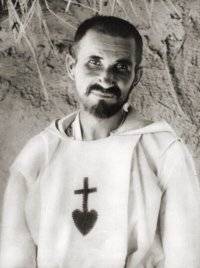Blessed Charles de Foucauld
Born in Strasbourg, France, on 15 September 1958.
Killed on 1 December 1916 in Tamanrasset, French Algeria.
Beatified by Pope Benedict XVI on 13 November 2005.
Feast day - 1 December.
Mark, from England ![]()
"Charles de Foucauld was born in Paris and was the son of a Count. Very early in his life he lost his faith and he led up until he was about 26 a fairly wild life; he had mistresses, and drinking, and he was a soldier, and he'd completely rejected the idea God existed. Anyway he had a great crisis in the middle of his twenties and he said very profoundly 'The moment I realised that God exists, I realised I had to give my life to him.' .. So he became a religious and he moved to the middle of the Sahara desert, to the middle of an Islamic tribe, and he set up a church. And in the middle of this tribe he planted the Blessed Sacrament, he planted Jesus Christ Himself, and he allowed the presence of the Eucharist to change his life and to change the lives of those around him. He allowed the simple presence of Jesus, body, blood, soul and divinity, to transform his heart. "
Blessed Charles de Foucauld - Retreat at Nazareth 1897 (trans. Charlotte Balfour, 1930 rev.)
Faith is that which makes us believe from the depths of our souls (...) all the truths that our religion teaches us, all that the Gospel holds and all that the Church sets before us. The just man lives truly by this faith (Rom 1:17), for it replaces for him the greater part of his natural senses. It so transforms all things that the senses are of little use to the soul, which through them is only deceived whilst faith shews it realities.
Where the eye sees but a poor man, faith sees Jesus (Mt 25:40). Where the ear hears curses and persecution, faith sings: “Rejoice and be glad” (cf Mt 5:12). The touch feels only blows and stonings, but faith says: “Be glad you are deemed worthy to suffer for the name of Christ” (cf. Acts 5:41). (...) The smell perceives only incense; faith tells us that the true incense is “the prayers of the saints” (Rv 8:4).
The senses lead us astray to created beauty; faith thinks of the eternal beauty and despises all created things, for they are as nothing and as dust beside that beauty. The senses hold pain in horror; faith blesses it as a marriage crown that unites it to its Beloved, like a walk with her Bridegroom hand in divine hand. The senses rebel against injuries, but faith blesses them: “Bless those that curse you” (Lk 6:28) (...); she finds them sweet, for in them she shares the lot of Jesus. The senses are full of curiosity; faith is content to know nothing: she thirsts to bury herself, and longs to pass her life motionless before the Tabernacle.

